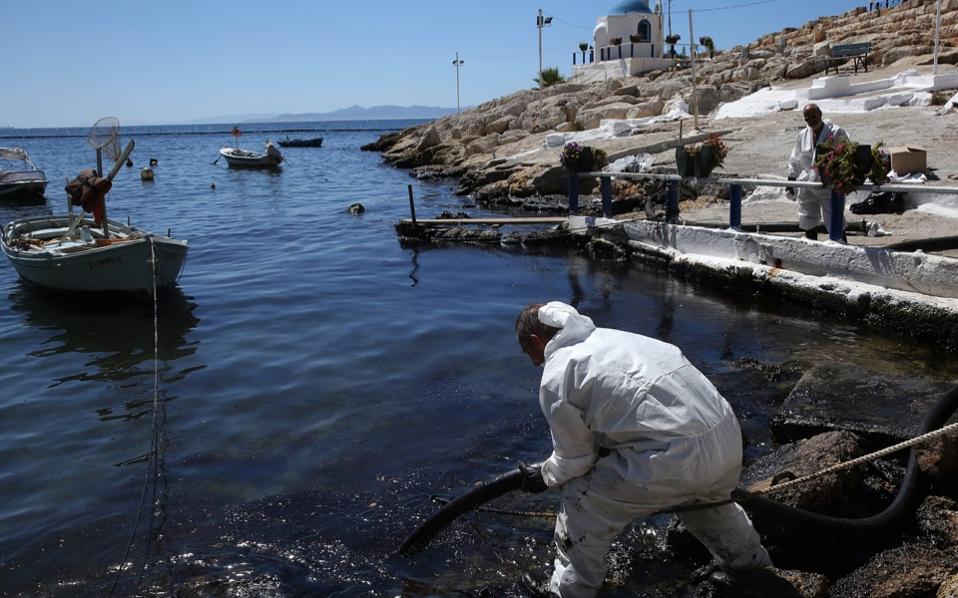Polluters must pick up tab for damage to planet, says UN environment chief @ErikSolheim https://t.co/NAtU3Wp7Oc @SophieHares @UNEP pic.twitter.com/P8TMayI7HG
— alertnetclimate (@alertnetclimate) 19 september 2017
The above makes perfect sense. Pick up the tab, like a rock band that destroyed a hotel room, our pollutors, when it comes to CO2 or other harmfull ‘externalities’ need to pick up the tab. Pay for the restauration, cleanup. We have seen this in many oil spills, Exxon Valdes, the Gulf oil spill and most probably now in Athens, which has had a major oil diseaster nobody reports on.

Clean this up oil dickheads
But money on it’s own is not the best remedy against such events, whether it is toxins that kill small animals, bees in the US right now, or some mine who’s toxic basins have overflowed in a storm or the dams of which have broken, like it happend in Spain. All these events have and would cost enormous amounts of money to deal with, and these companies (for example BP) would be fighting the claims all the way, or simply fall over like TEPCO, go bankrupt, and go home.
Our money is carbon credit. If it doesn’t buy fossil fuels it is still useless, This is not an accident. Our economy is a system to distribute fossil resources (and indirectly all others) to maximize the cashflow for private banks and profit for private oil companies.
We have been writing about something we call carbon credit. This is our money. It has value in our economic system anyone who owns it can buy fossil fuels with it. This is the hidden fundamental assumption in our economy. Most people think of money in terms of some universal trading token, but it isn’t universal, there is an mechanism at work we need to aknowledge, and this is the competitive distribution of fossil resources through competition for money.
Just try to think of a world in which the Euro or Dollar bought everything except fossil fuels. You could work but you can’t heat your home with your paycheck. You could not drive anywhere. You could not buy bread because the baker needs something to heat the ovens. You could not buy clothes because the logistics of them is fossil based, the growing of cotton is fossil fuel based. You could not go to a movie because the projector needs electricity from fossil powered power plants. Even if the mix is shifting today, our credit system relies on fossil fuels, not renewables. That is why we call it the carbon credit system.
If you ask for money to restore nature you will recieve fossil credit, and using it will destroy the world some more.
“Picking up the tab” in this system, so lets assume for a second there’s no renewables at all, means the pollutor has to allocate money to buy fossil fuels to fix things. The diesel in the ships that clean up an oil spill, the diesel in the trucks that deliver the chemicals that clean the birds, or those that plant trees. In some cases there is no other measure but time, and then the victims are awarded money because their lives have been shortened or destroyed. That money is spend on trips and food and clothes, so on fossil fuels. In the end, as our economy dictates, no real progress has been made, we are stuck in a profitable near misery and mild stress. The disaster has been forgotten, the claim money stream blocked pending a court case the claimants can’t afford. The mentality of the industries that is causing these problems is really that grim.
So how to deal with pollution from industry in general. The key is to avoid the ‘economy’. The key is to allocate resources towards the creation of an independent capacity to restore and revive our environment or ecological resources. Up until now it has been done within the economic system, and this meant that certain problems (like the manure nitrogen problem) actually became economic cash cows, incentivising the distruction of ground water by dumping nitrogen on land, while also keeping up the nitrogen fertilizer cashflow.
Clean up companies need to be green themselves. So a oil spill cleanup needs to be done with electric ships, running on solar. To get these ships and the solar power plants to power them one can use claim money. The simple pattern is you green your clean up operation first, then clean up. Another is to reduce the need for whatever caused the disaster as a way to reduce the risk. So if a tar oil train derails and burns a town. use the money to lower the demand for tar, using renewables.
This does two things. First it creates an independent capacity to restore and clean up nature, that can operate and very low cost, because it has it’s own energy (and perhaps food) resources. Secondly the punishment of spilling oil is not selling more oil, but less in the future. The money which can run in the billions in each case, is much better spend in long term energy resources, in autonomous clean up capacity, than on temporary fixes.
When the Gulf oil spill happend, the solvent for the slick was tried and supplied kind of randomly. Without testing the health effects. It could be toxic, carcinogenic. It could be waste someone had in a pond that needed to be dumped somewhere, and now it was dumped on the oil spill and people where happy about it. This kind of screaming cowboy shit we don’t want anymore. Let all the disaster corporations pay into a claims fund that is used to run a clean energy powered taskforce that can do cleanups, restaurations, all the stuff you need, and make the money go towards scaling up it’s operations wherever needed, or desired. That is also a great way to start the #Roboeconomy
